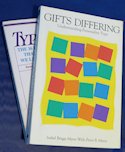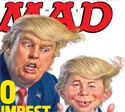
- About the MBTI
- Verify Your MBTI Type
- Personality Patterns
- MBTI Articles & Resources
- Article Directory for Educators & Students
- Books on Personality Types
- Emotional Intelligence & Personality Type
- Career Planning & MBTI
- MBTI Business Applications
- Lenore Thomson - Carl Jung Personality Type
- Site Map - Master Directory of All Articles
- MBTI Consultant Links
- Personality Type Workshops & Conferences
- Links to Other Type Websites
- Murder Mystery Business Theatre
- About Us
Articles on MBTI ® applications & Personality Types
Article Index
Page 1. Human Nature
Page 2. Problem-Solving
Page 3. Hiring & Staffing
Page 4. Normal Human Natures
This article was reprinted in Vol 7. No. 2 of the Australian Psychological Type Review, Phillip Kerr, editor, published by the Australian Association for Psychological Type, www.aapt.org.au
Practical Business Applications of the MBTI Myers-Briggs Personality Type Model
By Ross Reinhold, INTJ
Entire 2 - 3 day workshops can be devoted to specific practical applications of personality type. Leadership, team-building, career planning, time management, problem-solving are a few topics that come to mind. Attempting to capsule even one of these important "applications of type" topics in an article would result in an overview that wouldn't accomplish much but be an advertisement for enrolling in a specialized workshop!
So what I thought I'd attempt here is a more personal digest of what I've found helpful in Myers-Briggs to my various business and professional practices. Over my forty year career, I've logged some substantial tours of duty in management training and in counseling/coaching. Yet I am by nature a better doer than I am a teacher. I enjoy being "on the field, in the action" more than being on the sidelines as a a coach or trainer. My present occupation involves both roles, with a primary emphasis on the former. So this is a look at Type from what continues to be relevant now as a business practitioner whose opportunities to teach people about Personality Type come along infrequently and then only in bits and pieces.
Human Nature - teaching and practice
Prior to learning about Myers-Briggs in my mid-forties, I had considerable hands-on work experience plus training in applied psychology and human relations - both at the graduate level and in numerous post graduate workshops and courses. I even taught some management programs on human relations, employee motivation, conflict resolution, and the lot. For fifteen years prior to my introduction to the MBTI, my work, on a day-day basis, was heavily involved in labor relations and "employee problems."
Sometime after arriving at the state of being a seasoned labor relations guy, I realized much of what I learned in school and in early management education about human nature wasn't being applied in my actual dealing with people. My understanding of people existed in parallel universes: in one was the academic/education model of human nature and in the other was my evolving understanding from the school of hard knocks.
Two Faces - Two Natures
In working with people - managers, employees, union officials - I found people frequently had more than one side to their nature. The old saw applied that "once you get to know someone" you found yourself reworking your mental model of who this person is. I learned to look for that "other" person that sometimes lurked beneath the exterior I initially interacted with.
The Myers-Briggs MBTI model gave a meaningful structure to this experience. I discovered what I had been experiencing with people was the interplay and sometimes the cycling of the extraverted and introverted sides of their personality. This sharpened understanding now helps me see that both natures are real and a part of the whole of the person (Prior to this insight my tendency was to characterize one as the "real" person and the other as veneer or false).
Most often these two sides to a personality reflect opposite ends of the Myers-Briggs dichotomy. A person whose Feeling nature is extraverted will typically introvert their Thinking. More than once I've been caught off guard by a friendly, hospitable ISFJ (xxFJs extravert feeling) who situationally becomes quite logical, detached, and tough minded (read Thinking nature at work). The old "iron hand in the velvet glove" phenomena! Make no mistake. Both sides of this personality are real and while Feeling overall is preferred, there is a logical side.
A couple of my close ENFP associates have caught me in a different form of "gotcha" on this Thinking/Feeling coexistence. These types are characterized by introverted Feeling. Being sociable folks, their Feeling values are usually apparent. Yet frequently in public dialogue their extraverted Thinking is quite active - particularly when talking with others they perceive as logical thinkers. So in a discussion involving a problem or decision situation, "Logical Sally" or "Logical Fred" is engaged in an energized discussion that is well reasoned and generally ends in some sort of logical conclusion. But hold on. Later on, in the quiet of introverted reflection, "Feeling Sally" or "Feeling Fred" ends up reversing the decision or changing the course previously laid out. Does this mean that ENFPs really don't want their decisions or plans to be logical? No, they want both - yet if a dialogue doesn't provide proper opportunity to incorporate whatever might come from their Feeling side, you may find them later changing their mind and reversing field. Logical, makes sense, eh?
So as you become interested in Type and become somewhat proficient in "typing" others, watch out for the danger of stereotyping. Remember: Feeling types have a Thinking nature, Sensing types Intuit, etc. Preference does not mean absence of its opposite.
You would do well to understand and have some mastery of all of the "languages" of the 4 polarities represented by the Myers-Briggs dichotomies: E & I, S & N, T & F, J & P. Situationally you'll find yourself flexing among these different languages - sometimes with the same person in a short space of time.
(For a more technical explanation of this phenomenon of the opposite side to our type personality, see The Faces of Personality Type)
> > > Next Page - Know Thyself and Group Problem-Solving & Decision-Making
® MBTI, Myers-Briggs, Meyers Briggs, and Myers-Briggs Type Indicator are registered trademarks or trademarks of the Myers-Briggs Type Indicator Trust in the United States and other countries (aka meyers briggs or myers briggs).
Consultants & Coaches ® MBTI, Myers-Briggs, Meyers Briggs, and Myers-Briggs Type Indicator are registered trademarks or trademarks of the Myers-Briggs Type Indicator Trust |
![]()
Go Here to Learn more about Personality Type and Career Planning & Development
© Published by Ross Reinhold & Reinhold Development 1997 - 2023
Privacy Policy About Us

